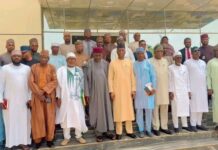For four days between the 25th to 29th November 2020, the board members, management and staff in the Directorate Cadre converged in the rustic village of Yankari Games reserve in Bauchi state for a strategic retreat with the theme “The Anatomy of a successful Hajj Financing and Logistic planning” t to address and plan for the future of Hajj financing and management in the face of the changing global operating environment and dynamics.
The training organized by the commission in partnership with the Nungu Business School drew facilitators from the public service leaders, internal and external, , the academia, financial aid management experts, past administrators etc
The man – in – the middle and Chairman of the commission, Alh Zikrullah Kunle Hassan set the tone of the discourse in his welcome address, declared
“this strategic retreat is a chance for us to look with new eyes alternative way of generating revenue without impacting negatively on the purse of pilgrims and quality service”.
Read Also:https://kaabanews.com/2020/10/nahcon-to-train-state-pilgrims-welfare-board-staff-on-hss-alhaji-hassan/
This retreat therefore provides an opportunity for participants to discuss and brainstorm on the emerging challenges arising from the dynamics of the current operating environments of Covid-19 pandemic, dwindling government funding, increasing tax policies in Saudi Arabia “
Therefore the Retreat must find solution to translate our dreams and objective of affordable cost of Hajj into reality and no place and time is better than here and now”
After the ground rule was adopted, the first paper presenter Muhammad Dasuki Ibrahim Arabi who is the Director General of the Bureau of Public Service Reforms explained that the success of any strategic plan is dependent on the understanding of the expectations of the staff by the leadership.

He said that success can only be achieved if the strategic plan is staff and peoples friendly and therefore advised that the Commission leadership should carry along all sides and work harmoniously for the success of its plan.
Alh Arabi further advised the leadership that while providing the strategic direction must always uphold the ethical values and comply with public service rules and financial regulation everytime to avoid sanctions.
In a second paper, Dr Tayo Kayode said an organization on strategic renewal like NAHCON must of necessity embark on realty checks for its staff and management to determined whether it can survive or really ready for the modern approach, what needed to be changed, the ingridient in the long term plan, the gaps and the strategy that needed to be used?
According to him the organization must identify its strengths, weakness, opportunities and threats to its objectives before embarking on the way to change.
Dr Jubril Salaudeen had the ground well covered in his comparative analysis of three countries t operating the contributory Hajj Savings Scheme,-Malaysia, Indonesia and the relatively unknown tiny island of Maldives where despite their trail blazing development also experienced disappointment and failures in the course of operating the system.
He therefore advised NAHCON not to be swayed by criticism or fear of failure as both are part of the learning curves or process. However, he warned the management not to be haste to catch up with the leading pacesetters but to thread with caution noting that each country has its peculiarities and therefore should not copy hook line and sinker from other land.
In the same respect, his paper on the Indian automobile maker TATA Nano was thought provoking. The paper presenter stated that the case of TATA motor was a study in patience, determination and perseverance to succeed as the auto firm had stumbled on several ocassions before it eventually found its feet and achieving its meteoric rise from obscurity of assemblage of scooter to become one of the largest auromotive industry in the world. Using it as a case study he told the participants of the tortuous way the company had taken while developing its concept of steady rise in automobile production
There was also much to cheer too from the paper presented by professor Gabadeen of the University of abuja entitled.
He said the commission in its bid to professionalizing the Hajj Industry possessed the human and capital resources to establish the Hajj Institute of Nigeria as a flagship to train budding financial aid Management experts in the industry. He however tasked the management to walk the talk if it was there dream to do so. He advised that the foundation to establishing the institute is dependent on the enabling legislative environment and the will to do so,so that the staff didn’t also get lost in the mix.
Four papers were delivered by three former board members and staff of the Commission, professor Badmas lanre Yusuf, Dr Sheikh Saleh Okenwa and Alh Suleman Usman who were commissioners in charge of Operations, PRSILS and former Directors in the department. While Dr’s Okenwa and Ibrahim Sodangi dwelt on the historical overview of NAHCON”s achievements and challenges since its Establishment in 2007, Prof Badmas and Alh Usman focused on the spirituality of Hajj and how it can be used optimally for commercial and financial benefit without the exploitation of the pilgrims.
The 3rd day was when the participants their moment through the group discussion
and project analysis as the participants were divided into five groups to present a position paper which were to form the resolution and Communique with the team leader or representative to present their decisions
After working for four days non-stop some of the outcome of the retreat was that there is need to diversification of Hajj from it as a religious rites but also as a business.
The concept of Hajj Savings Scheme as a forward looking strategy and instrument for financing and management of Hajj must be pursued promoted and achieved.
The commission must build the trust and confidence in its institution especially the HSS, by adopting the ethical values of transparency, accountability, integrity and honesty in line with the Islamic code of ethics.
There must be prescribe a strategic policy prescription to safeguard the health of HSS and its investments.
The need for a strategic alliance with major stakeholders including the media and the traditional local institution to promote HSS in every parts of Nigeria and most importantly a passion for service and to excel would be utmost icing on the cake.
The retreat may have come and gone but one fact that ran through the event and which must not allow to run out through the window was that no matter how much the management might determined and dedicated to the giving a strategic direction or statement, success can only be guaranteed if all the stakeholders upped their games and together then we will be stronger.





















